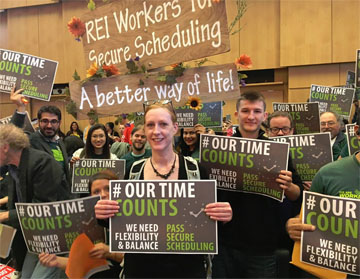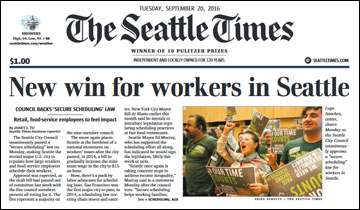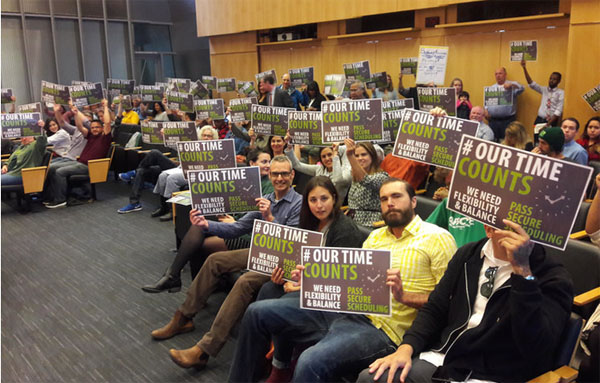LOCAL
History made: Seattle OKs secure scheduling
 SEATTLE (Sept. 20, 2016) — By a unanimous 9-0 vote Monday afternoon, Seattle made labor history once again by passing secure scheduling — the first new labor standard to address weekly work schedules since overtime pay became law in the 1930s. This landmark victory in Seattle is only the beginning in the fight for balanced and flexible schedules in Washington state and across the country.
SEATTLE (Sept. 20, 2016) — By a unanimous 9-0 vote Monday afternoon, Seattle made labor history once again by passing secure scheduling — the first new labor standard to address weekly work schedules since overtime pay became law in the 1930s. This landmark victory in Seattle is only the beginning in the fight for balanced and flexible schedules in Washington state and across the country.
When Seattle workers won access to paid sick leave in 2012 and the nation’s first citywide $15/hour law in 2014, new standards were set that everyone should be able to earn paid leave when they or family members are sick and everyone should receive a living wage for every hour they work. San Francisco, Los Angeles, New York, and California soon followed with $15/hour laws of their own.
This November, people across Washington state will vote on Initiative 1433, a ballot measure which will substantially raise the statewide minimum wage to $13.50/hour and allow all workers throughout the state to earn paid sick leave. (Learn more.)
With Monday’s unanimous vote to pass secure scheduling, Seattle workers are once again breaking new ground by establishing a new principle: that everyone should know when they’re going to work and how many hours they’re going to get.
“Today is the just beginning for secure scheduling,” said Working Washington Executive Director Sejal Parikh. “Seattle workers made this happen, but the crisis of unpredictable and unstable work schedules doesn’t end at the city limits. In just the last few days we’ve seen the mayor of New York City announce plans to take on secure scheduling, and they’re surely only the first to follow. We look forward to seeing who’s next as a new wave sweeps across the nation in the footsteps of the fight for $15.”
 Seattle Mayor Ed Murray says he will sign the secure scheduling legislation, likely this week or next. He released a statement Monday that said, “Seattle once again is taking concrete steps to address income inequality. Secure scheduling helps working families, young people, students, and workers of color by providing stability and clarity to their work schedule.”
Seattle Mayor Ed Murray says he will sign the secure scheduling legislation, likely this week or next. He released a statement Monday that said, “Seattle once again is taking concrete steps to address income inequality. Secure scheduling helps working families, young people, students, and workers of color by providing stability and clarity to their work schedule.”
The minimum wage hits $15/hour for the first group of Seattle workers on Jan. 1, 2017. The secure scheduling ordinance takes effect six months later, on July 1, 2017.
Big corporations are driving workers’ lives out of balance. Instead of offering predictable shifts and reliable hours, companies like Starbucks, McDonald’s, and Target are increasingly demanding 24/7 availability, even for part-time jobs, with hours that vary wildly from week to week. This has dramatic impacts on workers lives, incomes, families, communities, and opportunities: you can’t live your life on a few day’s notice, you can’t make a budget if you can’t predict your paycheck because your hours change dramatically from one week to the next, and you can’t build a better future when you don’t have the flexibility to go back to school, get a second job, or pursue your dreams.

What the Secure Scheduling Ordinance Will Do
Seattle’s secure scheduling ordinance address this crisis by setting new standards for people who work at large coffee, retail and food chains:
● Two weeks advance notice of schedules, and a periodic good-faith estimate of hours.
● Predictability pay when changes are made: one additional hour when an employer adds a shifts and half-time pay for hours that are cut. (Shift swaps and other voluntary changes by employees of course do not trigger predictability pay.)
● A right to rest that eliminates mandatory clopens by requiring 10 hours rest between shifts which start on consecutive days. (This does not affect split shifts or doubles; voluntary clopens would be paid at time-and-a-half)
● Meaningful input into work schedules, particularly as it affects caregiving, eduction, second jobs, and other important needs.
● Strong protections against retaliation.
Seattle’s secure scheduling ordinance will cover tens of thousands of people who work at coffee, retail, and fast food chains with more than 500 global employees, as well as full-service restaurant chains with more than 500 global employees and 40 locations. For more information, visit Working Washington’s website.
Working Washington contributed to this report.





